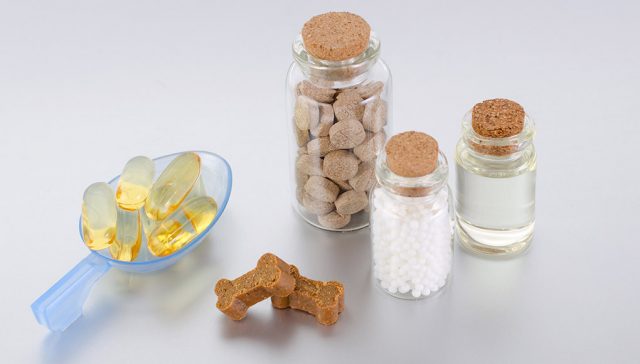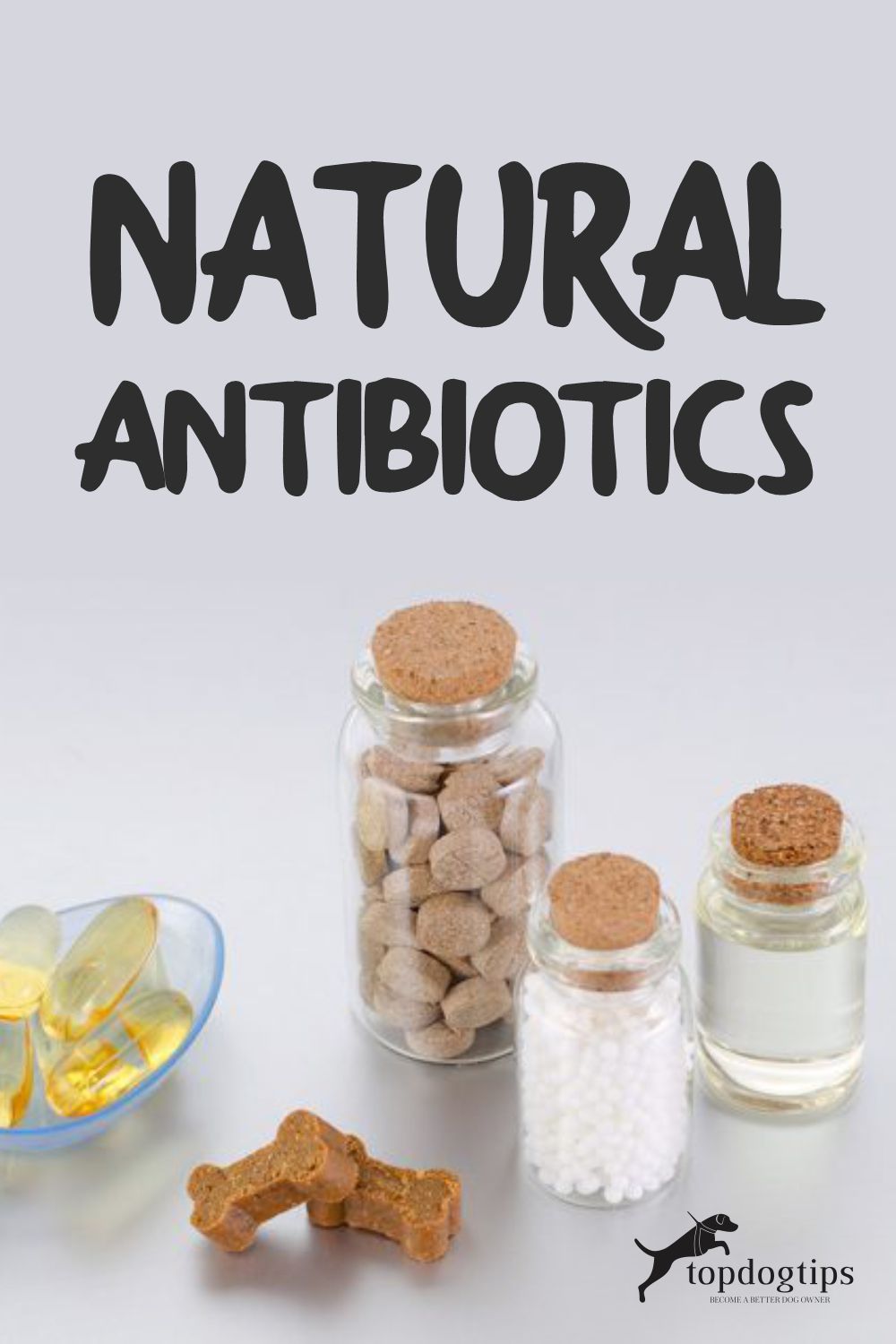
Table of Contents
- What are the Best Natural Antibiotics for Dogs?
- Plants With Strong Antibacterial Properties That We Can Use On Our Pets
- Natural Antibiotics Recipes for Dogs that You can Try
- Frequently Asked Questions about Natural Antibiotics for Dogs
- Natural Antibiotics for Dogs: Good or Bad?
- Final Thoughts About Natural Antibiotics
If your dog has developed an infection and you have taken him to the vet, he will probably be prescribed an antibiotic specific to the disease and especially suitable for the dog.
But have you ever heard of natural antibiotics as an alternative to conventional ones?
Surely, after reading this article, your idea about the consumption of common traditional antibiotics could change.
There is no doubt that one of the greatest advances in human medicine has been the discovery of penicillin and antibiotics.
Before then, a simple injury or even a trivial illness could even cause death.
Unfortunately, the excessive use of these antibiotic drugs could sooner or later have a very high cost to our dogs' health.
So, what natural antibiotics can we use when faced with these situations?
Keep reading as we dive deep.
What are the Best Natural Antibiotics for Dogs?
Among the best natural antibiotics for dogs, we found the following:
Essential Oils
Essential oils are great natural antibiotics for dogs to fight bacteria and help with behavioral problems like anxiety.
Always use pure essential oils, making sure there are no additives. Essential oils need a carrier oil like coconut oil and should not be applied directly to the skin.
As with most natural remedies, only use the recommended amount to prevent any negative side effects or damage.
Essential oils are a powerful and concentrated version of herbs and plants; a single drop goes a long way.
You should not use certain essential oils and herbs on cats and dogs, so always do your research first. They can be used to treat ear infections and can be used in conjunction with conventional antibiotics to reduce earache.
Calendula and St. John's Wort oil can be used directly in the ear.
Some essential oils also have excellent antifungal properties and can treat yeast infections of the skin and ears, such as lavender and oregano oil.
Lavender oil is also great for preventing fleas and ticks, which transmit Lyme disease.
Colloidal Silver
Colloidal Silver strengthens the immune system and, apparently, has the ability to penetrate even at the cellular level and destroy pathogens such as bacteria, parasites, viruses, and fungi.
You can apply this natural antibiotic either orally or cutaneously.
Oregano Oil
A traditional antibacterial whose phenols can be very effective in eliminating microbes and bacteria. It is also antiviral and antiparasitic.

Plants With Strong Antibacterial Properties That We Can Use On Our Pets
Calendula (Calendula Officinalis)
Calendula has been found to have antibacterial, antiviral, and antifungal properties. Topically, it is very effective in disinfecting and healing wounds.
It acts as a general tonic and stimulates the liver and immune system when taken internally as a tea or tincture.
Yarrow (Achillea Millefolium)
Yarrow has antibacterial, anti-inflammatory, and antiseptic properties. Used externally, it is a good wound healer of all kinds. Stops bleeding and infections.
Taken internally, it supports the liver, relieves an upset stomach, and aids poor digestion. It is widely used to treat fevers, colds, and flu-like symptoms.
Turmeric (Curcuma Longa)
This powerful herb is anti-bacterial, anti-inflammatory, and a powerful antioxidant. Topically it can be used (mixed with manuka honey – another natural antibiotic) to stop skin infections.
Taken internally, it stimulates the liver and is good for gastrointestinal problems like irritable bowel syndrome.
Echinacea
It is known for its ability to balance the immune system and, due to its powerful anti-bacterial and anti-inflammatory properties, it is effective against all types of infections.
Grapefruit Seed Extract
It is a powerful natural antibiotic, very useful in diarrhea when something unhealthy has been eaten.
Culinary Herbs
You can also easily use some herbs from your kitchen as canine antibiotics.
Herbs like thyme, basil, pepper, ginger, and garlic have antibacterial properties.
Propolis
It is an excellent natural antibiotic and topical disinfectant.
Liquid propolis can be applied to burns, minor wounds such as cuts and scratches.
It can also be mixed with aloe vera gel if the affected areas are large.
Oatmeal
It would be impossible to list the benefits of oats in a post without tiring the staff, so let's move on to what interests you now: the beneficial effects of oats on the skin: Calms the itch; Soothes irritation; Returns elasticity to the skin; Fight dryness; Helps in hypersensitive skin.
Fish Oil
Due to its high content of Omega 3 fatty acids, it also has a positive effect on metabolism, allergies, and inflammatory processes, for example, in the context of joint diseases.
In this sense, you can use wild salmon oil or cod liver oil.
MSM (Methylsulfonylmethane)
A little miracle of nature.
It is used mainly as an anti-inflammatory and against allergies, autoimmune diseases, diseases of the gastrointestinal tract (e.g., gastritis, IBD, inflammation of the anal glands) the skin.
Applicable in cases of pain due to inflammatory processes in the joints and tendons and Leishmaniosis.
Vinegar
Both apple cider vinegar and wine vinegar are the champions in the fight against fungi in pets.
Vinegar is non-toxic and has different properties: It relieves itching caused by fungi, restores the skin's pH, Provides coat shine.
Local heat
This is a simple but generally effective solution.
By applying an electric blanket or a hot water bottle on the affected area, the heat causes blood vasodilation and consequently reduces inflammation and pain.
Garlic
Garlic has broad-spectrum antimicrobial activity against bacteria and fungi.
Despite its great medicinal properties, garlic can be a controversial natural remedy for dogs.
Garlic, shallots, chives, onions, and leeks are all part of the same food family that contains certain compounds that can be toxic to cats and dogs in large amounts.
When using garlic to kill bacteria and fight infection in dogs, you should only use organic, fresh, raw garlic in tiny amounts.
Epsom Salt
If your dog suddenly appears limping, he may have a sprain or strain. It's time to try Grandma's famous remedy of soaking some Epsom salt.
Add ½ cup of Epsom salt to a hot bath and let your dog soak for five minutes, twice a day.
If your dog disagrees with this method, you can soak a cloth in Epsom salt and apply it locally with warm water.
You will see how soon your dog can run and play as he always did.
Pumpkin
In older animals, digestion can be a bit bumpy. If your pet has a constipation problem, give him some canned pumpkin or diced plums to improve his digestion.
Coconut oil
Coconut oil is a topical and oral antimicrobial, preventing bacteria, viruses, and fungi.
It also helps heal wounds and can be taken internally to help with gastrointestinal problems.
Coconut oil is a safe ingredient in the correct amounts and is one of the best-known natural antibiotics for dogs, often used in shampoos and even dog treats.
When using coconut oil topically, use a pea-sized amount for every ten pounds of body weight, applying it to the skin down to the roots.
Coconut oil is an excellent carrier oil for essential oils when used on the skin.
Orally, you can use 1/4 teaspoon for every 10 pounds of weight.
You can also use coconut oil in the ear to help clean it and prevent infections and mites.
Coconut oil can be rubbed or brushed on the gums to help prevent periodontal disease.
Natural Antibiotics Recipes for Dogs that You can Try
Calendula and St. John's Wort can be used together to fight infections.
According to the Whole Dog Journal, you can mix them; One part calendula and one part hypericum with eight parts distilled water and spray on infections or wounds.
Colloidal silver can be used orally or topically to fight infection.
It comes in liquid form and can be used without carrier oils. It is tasteless.
Use a few drops daily to help with an infected ear or topically in an infection using a cotton ball.
Apple cider vinegar can help prevent urinary tract infections in dogs by mixing the solution with water.
One teaspoon of apple cider vinegar for a small dog and one tablespoon for a large dog, mixed in their water bowl.
You can also use it to clean a dog's ears.
Grapefruit seed extract can help treat gram-negative bacteria. According to Wag Walking, you should use one drop of the grape seed extract for every 10 pounds of dog.
Ten drops of liquid can be added to normal dog shampoo and used topically.
You can also use Turmeric and Manuka honey mixed to create the “Golden Paste,” which is an excellent natural antibiotic and a natural anti-inflammatory, antiviral and antifungal treatment.
You can add Manuka honey for additional antibacterial properties and use it on the infected areas.
Frequently Asked Questions about Natural Antibiotics for Dogs
Should I use Conventional Antibiotics or Natural Antibiotics for Pneumonia in Dogs?
Pneumonia can be fatal if left untreated in dogs.
There are a few different types of bacterial, inhalant, and viral pneumonia, according to PetcareRx.
Conventional antibiotics are recommended to treat pneumonia caused by a bacterial infection, as it can cause death from respiratory distress that can prevent the brain from receiving oxygen and sepsis.
Your vet can run tests to find the specific bacteria causing the infection and choose a custom antibiotic.
In severe cases, hospitalization is needed.
Home Remedy for Dog Ringworm Treatment: Should I Use All Natural Dog Antibiotics?
Ringworm is a fungal infection that affects the skin of dogs. It can affect any area, including the ear.
You can use natural remedies in the early stages of an infection.
If the ringworm does not respond to treatment, then conventional antibiotics should be used.
When not properly treated, ringworm can spread throughout the body and cause discomfort.
Ringworm is treated at home using apple cider vinegar mixed with 50/50 water and sprayed on the infected areas.
Staph Infection in Dog Home Remedy
Staph infections are common in young and older dogs, along with those with lower immune systems.
It can be caused by bacterial or fungal infections, illnesses, and allergies, according to PetMD.
Natural antibiotics for dogs can also be used as a last hope for staph infections that do not respond to antibiotics like methicillin-resistant Staphylococcus aureus (MRSA).
Topical natural remedies that use bacteria that fight natural antibiotics like oregano oil or Manuka honey and antiseptic shampoo can help treat staph, especially if they become resistant to conventional antibiotics.
Staph infections are usually secondary infections and can keep coming back if the specific cause is not found.
Is Oregano safe for Dogs?
Oregano Oil can be used as an antibiotic and antifungal in dogs to treat infections in small amounts.
Oregano oil is very different from oregano leaves and spices used in cooking. The oil is concentrated.
Only one or two drops should be used and diluted with a teaspoon of coconut oil.
You can use Oregano topically or orally to treat the infection. Oregano, dried or fresh, can cause digestive disorders in dogs.
Dog owners have been known to use the oil of oregano to treat ear infections and mites.
Natural Antibiotics for Dogs: Good or Bad?
Natural antibiotics for dogs are great for mild infections or infections that are caught early.
Conventional antibiotics can cause side effects like hives, rashes, yeast infections, and an upset stomach.
Natural antibiotics for dogs can be used to prevent wound infection and can be used to clean the ears.
Conventional antibiotics can kill the good bacteria in the body, which can lead to secondary infections.
Final Thoughts About Natural Antibiotics
Natural antibiotics for dogs can treat infections that have become resistant to bacteria or for dogs that are very sensitive to antibiotics.
Viral infections that are not responding to treatment with conventional antibiotics may then respond to the natural antibiotics.
Natural antibiotics for dogs often have antifungal properties in addition to antibiotic properties.
Read Next: 17 Herbal Remedies for Dogs

















